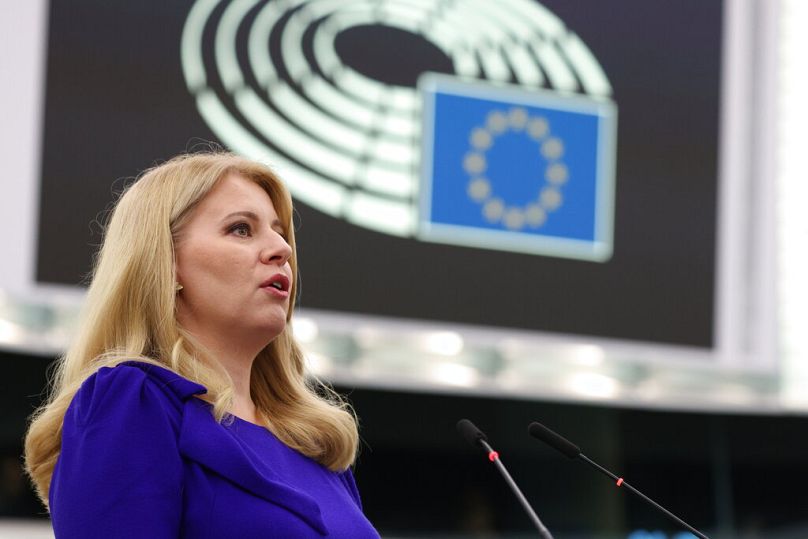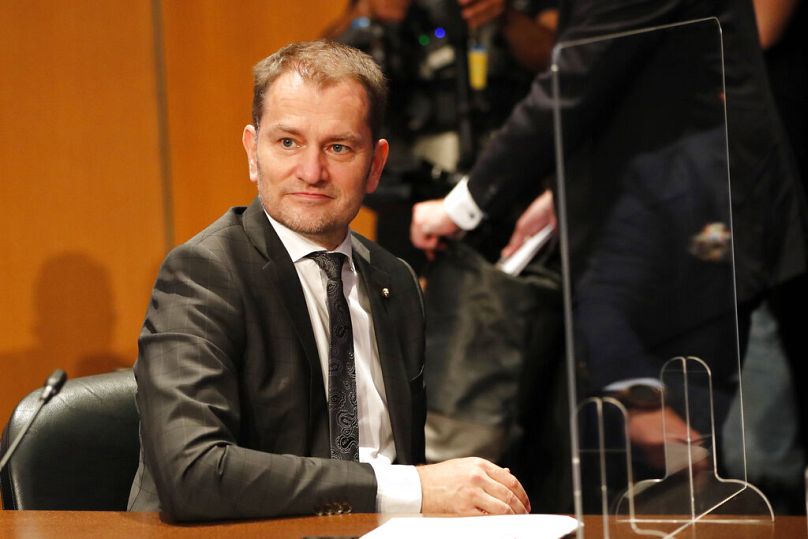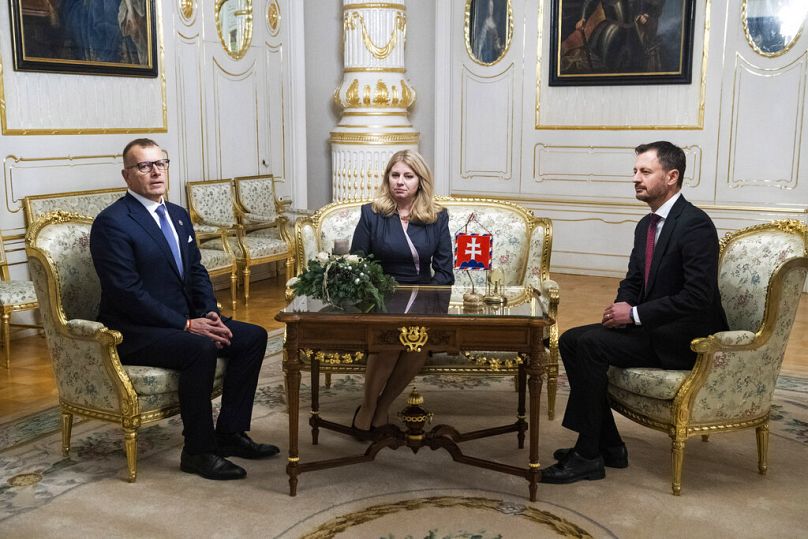As a result of the country's prolonged political crisis, Slovakia's President Zuzana Čaputová has appointed a government of experts, not politicians, to run the country.
After having to stand by and watch one minister after another argue and have their conflicting personalities stall political action in Slovakia for months, President Zuzana Čaputová has decided to take the task of stabilising the country into her own hands.
On Friday, Čaputová announced her appointees for an entirely new caretaker government, consisting solely of experts in their respective fields and without any ministers coming from the political parties.
Taking a cue from her own decision to abandon her career in civil society to become president, she urged the Slovak public to remain open-minded and to appreciate the massive sacrifice the new appointees in the caretaker mandate were making by abandoning their non-political positions to enter the government.
"I know very well how difficult such a decision is and how deeply it interferes with personal life. The people who go for it have my gratitude and respect. Let's give them a chance, let's not judge and condemn them in advance on the basis of purposeful lies that will certainly will be discovered," the president said on Friday.
The caretaker government that was in power since December fell apart last week when caretaker Prime Minister Eduard Heger also offered his resignation.
In his place, Čaputová – Slovakia’s first female president, who boasts high support among Western allies – selected an expert government, headed by Ľudovít Ódor, who had until then served as vice-governor of the National Bank of Slovakia.
“The president said that if she feels the government is failing, she will step in and appoint an expert cabinet,” Grigorij Mesežnikov, President of the Institute for Public Affairs in Bratislava, told Euronews.
“The president is now part of the executive government, and the government will be ruling with Zuzana Čaputová.”
For the first time ever, Slovakia will have a government cabinet made up entirely of experts – or technocrats – with no party affiliation. This “government of experts” is set to begin their mandate on 15 May.
Why has Slovakia been embroiled in a political crisis?
In early 2020, the country breathed a collective sigh of relief when the left-wing populist SMER-SD party of former PM Robert Fico was ousted from power in the parliamentary elections.
Fico was known for his combative relationship with the media in the country, several corruption scandals, and allegations of extensive abuse of power.
His popularity saw a rapid decline after the murder of investigative journalist Ján Kuciak and his fiancée Martina Kušnírová. Kuciak was investigating tax fraud among associates of the Slovak government, and possible political connections with the Italian organised crime syndicate 'Ndrangheta.
In March of 2020, a coalition of conservative, right-wing, liberal and centre-right parties led by Prime Minister Igor Matovič formed the new government. While it was an uneasy coalition, they were united by their respective campaigns promising to be an alternative to Fico.
However, the government collapsed almost exactly a year later in 2021, when news leaked that they had signed a secret deal to obtain the Russian Sputnik V vaccine. Elections were prevented by a reshuffle, which is when Matovič’s deputy in the OL’aNO party, Eduard Heger, became the new PM.
In the autumn of 2022, the Freedom and Solidarity (SaS) party left the ruling coalition due to a dispute with Matovič – who had become finance minister in the meantime – over the handling of the energy crisis.
SaS demanded the drafting of a new coalition agreement and the departure of Igor Matovič from his post. When these conditions were not met, SaS joined the opposition.
Heger’s government lost its majority, and in December, a vote of no-confidence also tabled by Freedom and Solidarity delivered the final blow and paved the way for early elections.
“There are two reasons why the government fell apart last year,” said Mesežnikov. “The first was due to ideological differences of the parties, including liberals, conservatives and even reactionary and libertarian parties. They agree to implement the common program but one party rejected to do this, making it an incoherent coalition.”
“But the bigger issue were the personal relations between these leaders, in particular the inability of Matovič, the first prime minister, to cooperate with political partners. He was absolutely unrestricted in his political invention, he proposed things that provoked issues within the coalition and was hostile to other government partners.”
Richard Sulik, the leader of Freedom and Solidarity, and “his personal animosities were the obstacles to the continuation of the common government” which Mesežnikov said ended up being even more important than discrepancies in policy proposals.
Exodus of ministers
But the crisis does not end here. Heger became caretaker and was supposed to help the country smoothly transition to elections later in 2023, especially considering that Slovakia continues to play an important role in the supply of weapons to Ukraine.
Last week, Agriculture Minister Samuel Vlčan resigned after it became public that his personal company, Reko Recycling, received an EU grant from the Ministry of Environment. A day after him, the foreign minister resigned.
At this point, the government had already been missing a finance minister – Matovič was removed from his position in December by Čaputova so that a budget for 2023 could be passed. Also, the health minister had resigned in early March.
“According to the law, it is impossible to replace them with new ministers, so the PM was responsible for these missing positions,” said Mesežnikov.
Basically, Heger was juggling the caretaker PM position with two empty ministerial posts before he lost two more ministers last week.
“So the PM would have to take on responsibility for two other positions. It’s possible in the sense that the state secretaries would be acting in these positions, but it made the government basically dysfunctional,” continued Mesežnikov.
That is when Heger finally threw in the towel himself, and Čaputova stepped in to do a clean sweep of the entire government.
In chaos, a silver lining
The new Prime Minister Ľudovít Ódor seems to be most promising of the bunch. The calm, mild-mannered banker is widely considered to be one of Slovakia’s best-known economists.
“Odor is a good economist, he is the vice-governor of the National Nank and the author of popular publications on economics. So he’s a typical policymaker who had managerial and not political positions,” explains Mesežnikov.
Once he assumes his position next week, Ódor will be the first ethnic Hungarian prime minister in the country's history. Slovak Hungarians are the largest minority in the country, numbering at around 9%.
However, Ódor is relatively unknown in mainstream circles. Recent polling showed that over 70% of the Slovak population did not know who he was.
“My expectation is that in the next couple of months, Ódor could become the most trustworthy and popular politician in the country,” Mesežnikov adds.
Once it assumes power next week, the new caretaker government has a one-month period during which it needs to have its program or “manifesto” approved by the parliament.
While the vote could go either way, during this period, Slovak law guarantees them special privileges that make them more powerful than an average caretaker government for that one month.
This means that they could vote or move on what is considered to be a backlog of around 250 pieces of legislature that were sidelined due to the political crisis.
“This expert government, if they’re smart, can use this time to make some really important changes,” Mesežnikov concludes.















